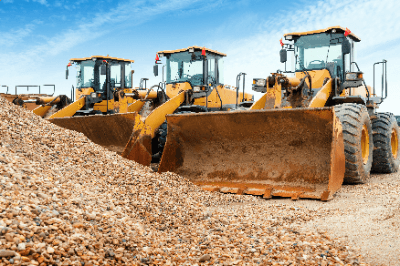What Is an Excavator?

An excavator is a machine used for digging soil or creating holes in the ground.
There is a wide variety of excavators, ranging from those suitable for single-person operations to large-scale facilities.
Uses of Excavator
Excavators are employed for digging up soil and creating holes. In agriculture, they are often used for small-scale purposes such as driving stakes or erecting support posts in fields.
Additionally, shovel loaders and bulldozers fall under the category of excavators and can move large quantities of soil and rocks.
Features of Excavator
Advantages
Excavators excel in tasks such as moving large quantities of soil, which is not feasible with human hands, and drilling holes in hard soil. While manual work may suffice for small-scale agricultural operations, as the size of the field or the variety of crops increases, the overall workload also increases.
In such cases, the use of an excavator can significantly lighten the labor involved.
Disadvantages
One drawback of excavators is the associated cost. Excavators come in various types, but particularly electric or engine-powered ones tend to have high initial costs.
Moreover, since excavators can only be utilized for specific processes when considering their use in small-scale home gardens or fields, a balance between cost and workload needs to be evaluated.
Types of Excavators
There are primarily three types of excavators:
1. Manual Excavators
Manual excavators involve thrusting the tip into the ground and rotating the handle to dig a hole. Since they operate manually, they have limitations on the amount of soil that can be excavated and the size of the holes.
However, for those involved in small-scale gardening or home gardening, where the frequency of excavator use may be low, or for tasks requiring the digging of small holes, manual excavators can be advantageous depending on the method and situation.
2. Electric Excavators
Electric excavators operate by charging a battery before use. Compared to manual excavators, they offer ease of excavation through electric power. Additionally, being electric-powered results in lower noise levels during operation, making them suitable for use in farmland near residential areas.
However, due to the high electricity consumption during excavation, the continuous usage time is limited. Moreover, if the battery malfunctions, the cost of repair or replacement is likely to be higher than the main unit.
3. Engine-Powered Excavators
Engine-powered excavators operate using fuel. They have significant horsepower compared to electric ones, enabling longer operating times. For relatively larger home gardens or fields, engine-powered excavators with sufficient horsepower and extended operating times are recommended.
However, caution is needed when using them in locations near residences, as the noise generated during operation can be substantial. Additionally, the higher horsepower increases the burden on the operator.
How to Choose an Excavator
When selecting an excavator, it is essential to consider factors such as hole size and operating methods.
1. Hole Size
When using an excavator in fields or home gardens, it is crucial to determine the desired hole size. Each excavator has a maximum drilling capacity, so understanding the required capacity is essential.
2. Operating Method
As mentioned earlier, excavators come in various types, including manual, electric, and engine-powered. Since each type has different merits and drawbacks, thorough comparisons should be made before making a choice.
For instance, in fields near residential areas where noise or exhaust gas issues may lead to complaints, manual or electric excavators may be more suitable.